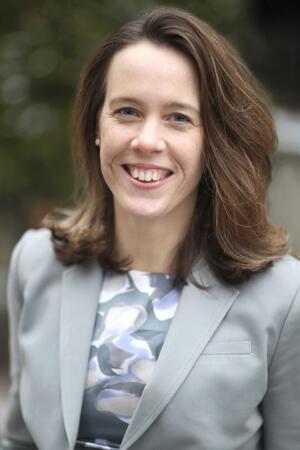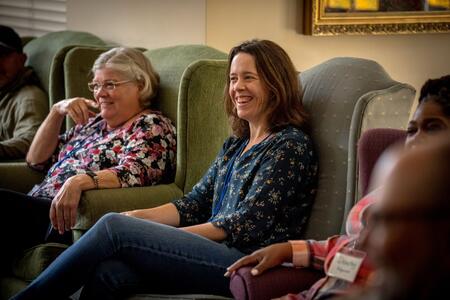By Kim Lawton
Traditional 12-step programs have long held that reliance on a “higher power” or “the God of my understanding” can be an important element of recovery. But according to Christine Curran ’09 M.A.R., some people need a deeper, more intentional faith connection to maintain long-term sobriety, secure stable housing, and rebuild their lives. Her organization, the Ignatian Spirituality Project (ISP), seeks to provide that.
 Launched 25 years ago, ISP’s mission is to “break the cycle of homelessness and substance-use addiction” by nurturing individuals’ spiritual lives. The group is nondenominational but supplements the 12 step with the spiritual approach of the Society of Jesus, known as the Jesuits, and the order’s founder, St. Ignatius of Loyola.
Launched 25 years ago, ISP’s mission is to “break the cycle of homelessness and substance-use addiction” by nurturing individuals’ spiritual lives. The group is nondenominational but supplements the 12 step with the spiritual approach of the Society of Jesus, known as the Jesuits, and the order’s founder, St. Ignatius of Loyola.
“We don’t make the claim that you need to have faith in order to recover,” says Curran, who has been ISP’s executive director since 2021. “People recover in a lot of different ways.” However, she adds, for many, “finding their sacred story and seeing where God has been at work in their life and then building that faith life as a foundation” has been transformational.
Cultivating the desire to change
Curran describes ISP’s philosophy as “strengths-driven,” focusing on the goodness and wholeness of the person first, rather than a “deficit-based approach” that focuses on the addiction. “When you can start with honoring who someone is, what they bring—their gifts, their story—healing can begin to happen. People can begin to see themselves as acceptable and worthy of love. And isn’t this the way God truly sees each of us?” she says. “As one of our team members said, ‘No one who ever criticized or told me what I was doing wrong ever made a difference in my addiction. But those who showed me love and compassion—even at my lowest point—made me want to change.’”
ISP offers three main components: overnight retreats, follow-up days of reflection, and ongoing spiritual support. The overarching goal, Curran says, is “to invite people who are in recovery from homelessness and addiction to encounter God’s love, hope, and healing.”
ISP began in the late 1990s when Father Bill Creed, a Jesuit priest in Chicago, and his friend Ed Shurna were trying to find ways to support men in emergency shelters on Chicago’s West Side. In addition to material necessities, they realized many of the men lacked spiritual support. The two invited some of the men to an overnight spiritual retreat. For centuries, retreats have been a hallmark of Jesuit spiritual life. They are usually centered around the Spiritual Exercises, a series of prayers, meditations, and contemplative practices developed by St. Ignatius in the 1520s.
Retreat and reflect
According to Curran, Creed and Shurna figured “if Ignatian retreats have helped Jesuits and so many others to find spiritual freedom and make good decisions, why wouldn’t it work for people in different circumstances of life?” The retreats caught on, and ISP was born. Today, ISP operates in more than 20 cities in the U.S., Canada, and Ireland. The group has more than 500 partners and has served more than 20,000 people in recovery.
ISP is a volunteer-based ministry. Although rooted in Ignatian spirituality, ISP partners with individuals and faith communities across the spectrum. “We run on people who care about this work, who care about creating spiritual care for those who are often invisible in our society, and can often be invisible in our churches,” Curran says.
ISP retreats last one or two nights and are kept small, generally 12 to 15 people of the same gender, along with three or four volunteers, one of whom is a retreat alum. Participants are usually already in the recovery process, such as those in transitional housing and those who are at least two to three months sober. The retreats take place in quiet, beautiful locations, often Jesuit retreat centers.
“(Retreat participants) are able to relax. They’re able to have some time together to share their story and listen to others,” Curran says. “No one’s proselytizing. We’re all just sharing.”
About a month after the retreat, local ISP groups organize a time of follow-up reflection where retreat alumni can discuss what they experienced and continue to build relationships with one another. In a growing number of cities, ISP affiliates are also developing programs to provide regular support via spiritual reflection circles. The programs vary depending on the area and the visions of local volunteers. Some of these programs are called “spiritual tune-ups” or “fill-up sessions.” ISP also has a mobile app to support this ongoing programming.
“We all love retreats, but how do we walk with people as they’re making their next steps in getting housing or maybe finding a job or going back to school or whatever their next step is?” says Curran. “What ISP does is as simple as it sounds: create spaces for people to belong and to connect with themselves and with a loving God.”
Curran sees her work with ISP as a way to live out a vocation that grew from her personal experience of God. She says when she was in her twenties, she “experienced a God that was a God of refuge, the God that protects and heals and cares.” As a Roman Catholic, she considered entering religious life but decided “that wasn’t quite right” for her. She worked for various faith-based organizations before coming to ISP eight years ago, first as director of programs and mission effectiveness and now as executive director.
While studying at YDS from 2006 to 2009, Curran deeply appreciated the ecumenical environment that permeated student and academic life. “There was just a depth of faith practice that really broadened my understanding of what it meant even to be a Catholic,” she recalls, adding that this has enhanced her work with ISP, which is open to people of all faiths.
She particularly appreciated classes on religious inculturation taught by Professor Lamin Sanneh (who died in January 2019). “He opened my mind to the way that the gospels and Christianity (were) enculturated in different parts of the world,” she says, adding that this concept aligns with the Ignatian view that “God bubbles up in different ways for each one of us.”
Curran says she is frequently aware of this in her work at ISP. “You walk into a shelter, you walk into a recovery center with people who have been on the streets for years, and they have experiences and ways of being in the world that I can’t even comprehend,” she asserts. “I’m not here to give you my sense of who God is and get you to jump on board with that. I’m here to listen … and learn from you because you have a piece of who God is that I need.”
 Part of a bigger story
Part of a bigger story
Individuals’ stories are a key element of ISP’s mission. “The stories we carry are an important part of what it means to be human. How we create and tell these stories helps to shape our purpose and direction—to know where we’re going and how to connect with other people and together become part of a bigger story,” Curran says.
She cites ISP team member George C. as a powerful example. George spent years homeless on the Boston Common before he got involved with ISP. Curran says George was deeply touched when he learned the story of St. Ignatius and how he begged for alms in order to finance his studies. “(George) once said to me that he never thought he would ever have anything in common with a saint,” Curran says. “But then he (realized), ‘I begged for years. I can understand that.’”
“It shocked me,” Curran adds. “Many people in traditional church circles would never really connect with that part of Ignatius’ story. But there are people who have experienced the trauma of being on the margins, and they have insights we have to learn from.”
George is now housed and remains active in ISP’s Boston chapter. But, Curran says, he remains very in touch with what he calls “his community” who are homeless. Every month, he takes a portion of his social security income, converts it into dollar bills, and goes down to the Common where he used to beg. Along with the dollars, which he uses as a way to start conversations, George distributes reflection cards that invite people to come to one of ISP’s spiritual tune-up sessions.
“It’s not just what we can give people in recovery, it’s what they can give back to the community and what mark they want to make on the world,” Curran says.
Curran acknowledges that homelessness and substance addiction are complex problems that may never be entirely solved. She takes a broader, more optimistic view of ISP’s work. “Regardless of what you believe we need to do to address homelessness and addiction in our country, one thing we know for sure is that relationships matter. Real relationships and connection are things we all need to live purpose-filled lives. At the end of the day, we can sit with someone, we can listen, we can make a connection. ISP is just taking time to make that connection,” she says. “And if enough of us can do that in our own way in this world, we’ll make it a better place.”
Kim Lawton is an award-winning reporter, producer, and writer who has worked in broadcast, print and online media. For nearly 20 years, Lawton was Managing Editor and Correspondent for the highly acclaimed national public television program “Religion & Ethics NewsWeekly.”